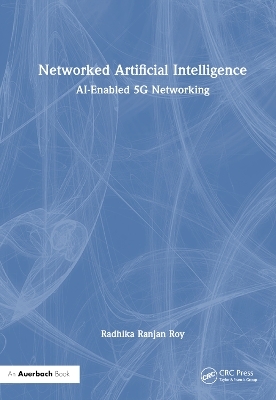
Networked Artificial Intelligence
Auerbach (Verlag)
978-1-032-80389-0 (ISBN)
The integration of fifth generation (5G) wireless technologies with distributed artificial intelligence (AI) is transforming network operations. AI is increasingly embedded in all network elements, from cloud and edge to terminal devices, enabling AI to function as a networking system. This convergence facilitates AI-based applications across the global network, with notable successes in various domains such as computer vision, natural language processing, and healthcare. Networked Artificial Intelligence: AI-Enabled 5G Networking a comprehensive framework for the deep integration of computing and communications, optimizing networks and applications as a unified system using AI.
The book covers topics ranging from networked AI fundamentals to AI-enabled 5G networks, including agent modeling, machine learning (ML) algorithms, and network protocol architectures. It discusses how network service providers can leverage AI and ML techniques to customize network baselines, reduce noise, and accurately identify issues. It also looks at AI-driven networks that enable self-correction for maximum uptime and prescriptive actions for issue resolution, as well as troubleshooting by capturing and storing data before network events.
The book presents a comprehensive approach to AI-enabled networking that offers unprecedented opportunities for efficiency, reliability, and innovation in telecommunications. It works through the approach’s five steps of connection, communication, collaboration, curation, and community. These steps enhance network effects, empowering operators with insights for trusted automation, cost reduction, and optimal user experiences. The book also discusses AI and ML capabilities that enable networks to continuously learn, self-optimize, and predict and rectify service degradations proactively, even with full automation.
Radhika Ranjan Roy is an electronics engineer, US Army Research, Development, and Engineering Command (RDECOM), Communications–Electronics Research, Development, and Engineering Center (CERDEC), Space and Terrestrial Communications Directorate (S&TCD) Laboratories, Aberdeen Proving Ground (APG), Maryland, since 2009. Before joining to US Army Research, he worked in various capacities in CACI, SAIC, AT&T/Bell Laboratories, CSC, and PDB since his graduation. He earned his PhD in electrical engineering with major in computer communications from the City University of New York, New York, in 1984, and MS in electrical engineering from the Northeastern University, Boston, Massachusetts, in 1978. He received his BS in electrical engineering from the Bangladesh University of Engineering and Technology, Dhaka, Bangladesh, in 1967. He has published more than 50 technical papers. He is holding and/or submitted over 30 patents. He authored a book titled Handbook of Mobile Ad Hoc Networks on Mobility Models in 2010.
1. Networked Artificial Intelligence 2. Artificial Intelligent Agent 3. Agent Function 4. Agent Modeling 5. Multi-Agent System 6. Protocol Layer Architecture 7. Artificial Intelligence Performance Analysis 8. Unsupervised Machine Learning 9. Supervised Machine Learning 10. Deep Learning 11. Overfitting and Underfitting 12. Hybrid Learning 13. Reinforcement Learning 14. Artificial Intelligence Application and Network Protocol Architecture Model 15. AI-Enabled Network 16. AI-Enabled End-to-End Network 17. AI-Enabled Peer-to-Peer Network 18. Artificial Intelligence-Enabled 5G Network
| Erscheinungsdatum | 11.09.2024 |
|---|---|
| Zusatzinfo | 75 Line drawings, black and white; 75 Illustrations, black and white |
| Verlagsort | London |
| Sprache | englisch |
| Maße | 178 x 254 mm |
| Gewicht | 570 g |
| Themenwelt | Mathematik / Informatik ► Informatik ► Software Entwicklung |
| Informatik ► Theorie / Studium ► Künstliche Intelligenz / Robotik | |
| Technik ► Elektrotechnik / Energietechnik | |
| Technik ► Nachrichtentechnik | |
| Technik ► Umwelttechnik / Biotechnologie | |
| ISBN-10 | 1-032-80389-4 / 1032803894 |
| ISBN-13 | 978-1-032-80389-0 / 9781032803890 |
| Zustand | Neuware |
| Informationen gemäß Produktsicherheitsverordnung (GPSR) | |
| Haben Sie eine Frage zum Produkt? |
aus dem Bereich


